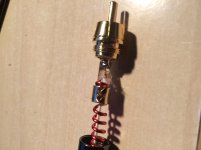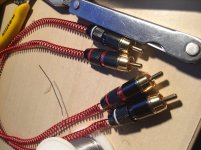Really pleased to have been able to put some new plugs on my Anti-Cable interconnects. It took a while to work out all the horrendous noises coming from my speakers where a result of interconnects breaking inside the plugs and shorting out and not the result of poor kit assembly or soldering.
I almost threw them out on the spot given the grief and possible damage they've caused but Anti-Cable seem to be silly price territory now so I wanted to salvage something out of them. Quick look on Ali-express and I found replacement plugs for a dollar each. They look and feel pretty good and the internal clamp squished down nicely on the springy anti-cables. Nice fix.


I almost threw them out on the spot given the grief and possible damage they've caused but Anti-Cable seem to be silly price territory now so I wanted to salvage something out of them. Quick look on Ali-express and I found replacement plugs for a dollar each. They look and feel pretty good and the internal clamp squished down nicely on the springy anti-cables. Nice fix.


I would still throw them out as they fail in the basics of being a cable. Or at least get a couple of meters of belden and make up a set with proper screening to compare.
Yes, throw them away. How can people charge money for such incompetent junk? How could someone be so stupid (or cynical) that they 'design' a cable in a way to maximise RF pickup?
Second thoughts: use a section of cable outer when you need a VHF inductor for some reason. Assuming they are copper, of course.
Second thoughts: use a section of cable outer when you need a VHF inductor for some reason. Assuming they are copper, of course.
Oh the horror cables without shielding - won't someone think of the children!!
Get over it they work very well indeed. The tighter coiled cables as pictured are sold for phono applications to reduce the chance of any interference. I suppose the theory is that the outer ground wire shields the one carrying the signal bit like a faraday cage.
I'll need longer cables soon for Monoblocks that I want to put nearer the speakers perhaps once cables get longer there is a bigger problem.
Get over it they work very well indeed. The tighter coiled cables as pictured are sold for phono applications to reduce the chance of any interference. I suppose the theory is that the outer ground wire shields the one carrying the signal bit like a faraday cage.
I'll need longer cables soon for Monoblocks that I want to put nearer the speakers perhaps once cables get longer there is a bigger problem.
The theory is bunk. To reduce the chance of intereference with a cox you need as much coverage as possible. This has very little so will not work well. It also has no real strain relief so as you have found it will fracture the return connection over time.
The signal actually goes down both wires. Kirchoffs law. One out one back.
The signal actually goes down both wires. Kirchoffs law. One out one back.
I have nothing to get over, as I have not paid a lot of money for junk. They do even worse (looser) cables too? If you really want to reduce the chance of interference then you need to buy an ordinary commercial quality cable, not 'audiophile' garbage. Fortunately, analogue audio is a fairly undemanding application of low speed electronics so rubbish cables can often work OK.Get over it they work very well indeed. The tighter coiled cables as pictured are sold for phono applications to reduce the chance of any interference.
What utterly stupid cables... Sorry, but you've been duped. Quality braided-screen cable is not hard to obtain and will perform better and not act as such an efficient microwave antenna either.
No they don't work well at all! All unbalanced interconnects need shielding.Oh the horror cables without shielding - won't someone think of the children!!
Get over it they work very well indeed.
That's as poor of a plan as you can get.The tighter coiled cables as pictured are sold for phono applications to reduce the chance of any interference.
That's not how electrical signals work.I suppose the theory is that the outer ground wire shields the one carrying the signal bit like a faraday cage.
No they don't work well at all! All unbalanced interconnects need shielding.
That's as poor of a plan as you can get.
That's not how electrical signals work.
Tell the guy that sells them. I bought the speaker cables first and they sound great and followed with ICs the only problems which have emerged recently from a lot manhandling making the IC brittle at or inside the plugs. As for hearing interference i’ve Had none till I re-arranged all the new stuff i’ve built and my speakers are good for 106db per watt.
Ok, four people, at least one of whom has a PhD are telling you these are bad cables. But you want to believe the salesman.
Did you tested another cables? How do you know that the equipment sounds good with these cables and not with another [Which for an engineer, it says that the cable is too critical part for a good amplifier design 🙂 ]I bought the speaker cables first and they sound great...
They are twisted wrong.
Stereo needs wires right twisted and left twisted as well as red and black plugs and wires.
Stereo needs wires right twisted and left twisted as well as red and black plugs and wires.
Do the same criticisms apply to this IC?
"Each ****** Interconnect is made by hand because this is the only way to build a cable that has the absolute minimum contact with the insulator. The signal travels through a very thin polyester coated enamelled copper wire, which is spiralled around a much thicker bare copper ground. Because signal and return conductors are so tightly spaced external electric fields cannot get in. As a result, these cables completely stop hum in valve amplifier setups, whilst blocking radio frequency interference (RFI)."

"Each ****** Interconnect is made by hand because this is the only way to build a cable that has the absolute minimum contact with the insulator. The signal travels through a very thin polyester coated enamelled copper wire, which is spiralled around a much thicker bare copper ground. Because signal and return conductors are so tightly spaced external electric fields cannot get in. As a result, these cables completely stop hum in valve amplifier setups, whilst blocking radio frequency interference (RFI)."

No I believe the four people I also believe solid core speaker cable sounds better in my system and followed the same logic for IC. I've got four unused plugs left and will need a couple of 2 metre IC shortly - point me at some cable below Nordost prices and i'll have a look.
True, but the only way I know to get the lower prices is to by in bulk:
https://ie.farnell.com/belden/1505f-b591000/cable-coax-rg59-u-black-304-8m/dp/1734736
https://ie.farnell.com/belden/1505f-b591000/cable-coax-rg59-u-black-304-8m/dp/1734736
It's better to alert the people that might waste money on them.Tell the guy that sells them......
Or the people that have already purchased them and later wondered why their hi-fi system is doing strange things.
Last edited:
Paul Speltz knows, he just chooses to ignore reality.Tell the guy that sells them...........
- Home
- Design & Build
- Parts
- RCA Plugs on interconnects